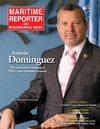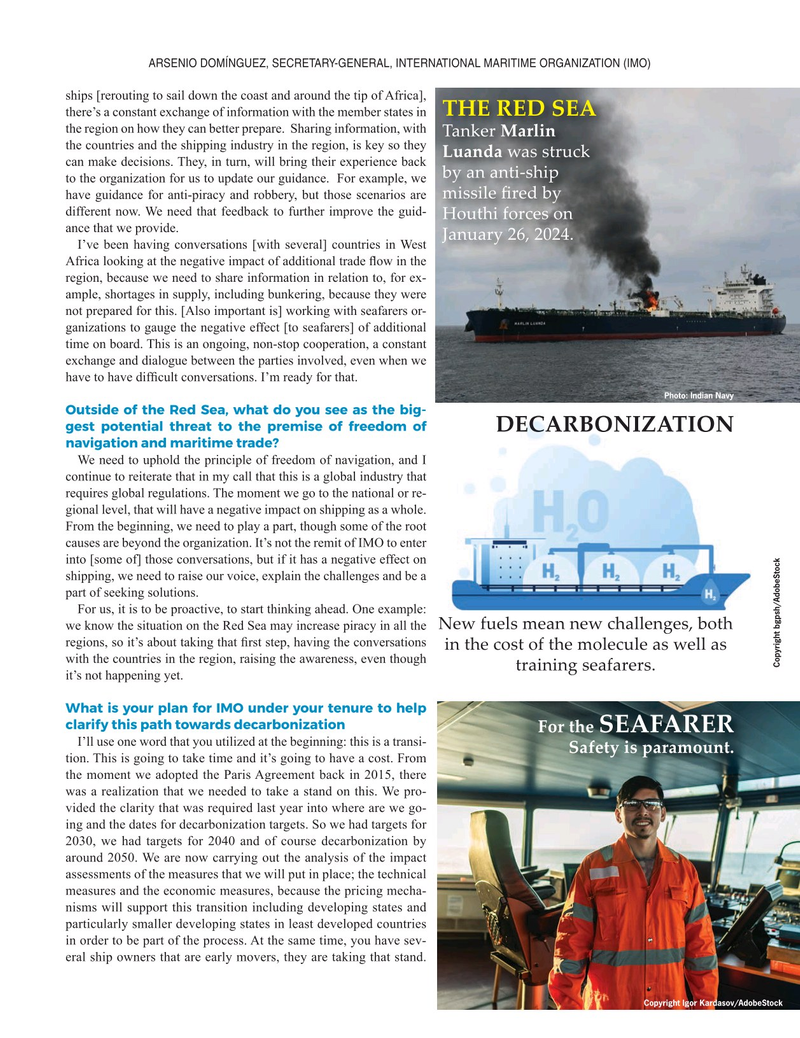
Page 31: of Maritime Reporter Magazine (May 2024)
Read this page in Pdf, Flash or Html5 edition of May 2024 Maritime Reporter Magazine
ARSENIO DOMÍNGUEZ, SECRETARY-GENERAL, INTERNATIONAL MARITIME ORGANIZATION (IMO) ships [rerouting to sail down the coast and around the tip of Africa],
THE RED SEA there’s a constant exchange of information with the member states in the region on how they can better prepare. Sharing information, with
Tanker Marlin the countries and the shipping industry in the region, is key so they
Luanda was struck can make decisions. They, in turn, will bring their experience back by an anti-ship to the organization for us to update our guidance. For example, we missile ? red by have guidance for anti-piracy and robbery, but those scenarios are different now. We need that feedback to further improve the guid-
Houthi forces on ance that we provide.
January 26, 2024.
I’ve been having conversations [with several] countries in West
Africa looking at the negative impact of additional trade ? ow in the region, because we need to share information in relation to, for ex- ample, shortages in supply, including bunkering, because they were not prepared for this. [Also important is] working with seafarers or- ganizations to gauge the negative effect [to seafarers] of additional time on board. This is an ongoing, non-stop cooperation, a constant exchange and dialogue between the parties involved, even when we have to have dif? cult conversations. I’m ready for that.
Photo: Indian Navy
Outside of the Red Sea, what do you see as the big- gest potential threat to the premise of freedom of
DECARBONIZATION navigation and maritime trade?
We need to uphold the principle of freedom of navigation, and I continue to reiterate that in my call that this is a global industry that requires global regulations. The moment we go to the national or re- gional level, that will have a negative impact on shipping as a whole.
From the beginning, we need to play a part, though some of the root causes are beyond the organization. It’s not the remit of IMO to enter into [some of] those conversations, but if it has a negative effect on shipping, we need to raise our voice, explain the challenges and be a part of seeking solutions.
For us, it is to be proactive, to start thinking ahead. One example:
New fuels mean new challenges, both we know the situation on the Red Sea may increase piracy in all the regions, so it’s about taking that ? rst step, having the conversations in the cost of the molecule as well as with the countries in the region, raising the awareness, even though
Copyright bgpsh/AdobeStock training seafarers. it’s not happening yet.
What is your plan for IMO under your tenure to help clarify this path towards decarbonization
For the SEAFARER
I’ll use one word that you utilized at the beginning: this is a transi-
Safety is paramount. tion. This is going to take time and it’s going to have a cost. From the moment we adopted the Paris Agreement back in 2015, there was a realization that we needed to take a stand on this. We pro- vided the clarity that was required last year into where are we go- ing and the dates for decarbonization targets. So we had targets for 2030, we had targets for 2040 and of course decarbonization by around 2050. We are now carrying out the analysis of the impact assessments of the measures that we will put in place; the technical measures and the economic measures, because the pricing mecha- nisms will support this transition including developing states and particularly smaller developing states in least developed countries in order to be part of the process. At the same time, you have sev- eral ship owners that are early movers, they are taking that stand.
Copyright Igor Kardasov/AdobeStock
MR #5 (18-33).indd 31 5/3/2024 8:44:41 AM

 30
30

 32
32
